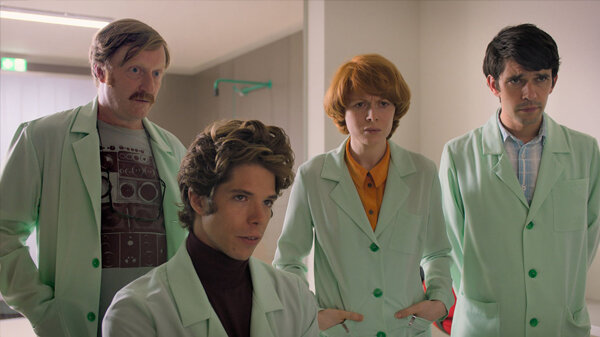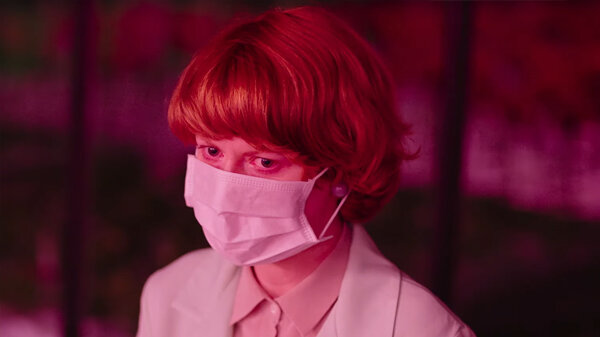One of this year’s most singular portraits of femininity, Little Joe sees British actress Emily Beecham search new corners of jarring and hypnotic performance for her turn as prickly plant breeder Alice in Jessica Hausner’s new film. Beecham sits down with Ella Kemp to talk about pink plants, seminal scientists and what a woman needs to convince anyone to let her make a film.
In a very quiet lab in London, the dangerous blush of a new kind of plant is growing. We’re under the watchful eye of Alice, an ambitious and important plant breeder on a mission to engineer happiness. Little Joe sees Austrian auteur Jessica Hausner make her English-language debut, with a peculiar and incisive portrait of a woman finding her bearings in her own mind.
Emily Beecham, who plays Alice, won the Best Actress prize in Cannes for her performance. It’s easy to see why – every inch of her character is sharp and alert, a curious example of a mother and an individual coming to terms with her independence: professionally, emotionally, philosophically. We spoke about uncomfortable humour, the sexual power of a haircut, and the possibilities of taoism and gaslighting to get to the root of the film.
Ella: How did you first get involved with the project?
Emily: I’d seen Jessica Hausner’s previous film Lourdes, which I love. Ben Whishaw was also attached. I was sent the script and there was so much to sink your teeth into – the lead character Alice is going through so many conflicts. She’s in this rabbit hole twisting and turning and doesn’t quite know what’s what. I love how in Lourdes, each frame is so beautiful aesthetically and then the acting is very natural with so much nuance.
Jessica also has quite dark humour in her movies too – I love that combination. She showed me all the design ideas, the plant, the colours, which was all quite a shock. We discussed a lot of what Alice is battling with: her conflict between her work and her son, and then prioritising her work, and that guilt that chips away at her. And also the idea of a woman who doesn’t have time off, no time for hobbies, the pressures of being a senior woman in the workplace, rejecting her love life. She feels like work is where she feels the most confident and comfortable and that she can control that – but the rest she can’t really.
Your performance is quite prickly and alienated. How did you develop that in a story driven by the solidity of this scientific team?
Jessica and I first rehearsed the psychotherapy scenes where Alice opens up about her secret worries. That affects a lot of her decisions. Emmanuelle Charpentier, a French scientist, was an inspiration. She invented quite a revolutionary gene-editing tool called CRISPR/Cas9 which allows you to quite specifically and quickly genetically engineer something. She’s very petite, wears neck scarfs which we stole the idea of, and she has a short quirky haircut. She’s very professional, very successful, has a lot of responsibility and admits she doesn’t really have time for hobbies. She also has a vulnerable and shy quality to her, but then in the workplace she seems quite dominant and confident, sometimes a bit prickly.
You mention the quirky haircut, which is major for Alice. I think of the quote from the second season of Fleabag, where Fleabag says to her sister’s hairdresser, “Hair is everything, Anthony”. How does hair affect the way you embody a character?
I think about this a lot in acting. I immediately embraced the idea to chop all my hair off and have a bowl haircut. It’s one of the first questions Jessica asked me, whether I’d be up for that.
So it wasn’t a wig?
It was my real hair, and I was super up for it. There’s something about hair that defines your sexuality so much, that when you decide to chop it off it’s just a different part of you. Especially having a short bowl like that. It’s almost like you’re saying to just focus on the work, you don’t want your sexuality to come into the conversation at all. I was also keen because throughout your career you get dolled up, people want you to have lots of makeup and long hair, so I was more than happy to change that story in a way. It’s quite a decisive change, to say, “This is what I want you to focus on”. How you dress and how you present yourself tells a story of how you want to be taken, how you want to be seen.
In terms of costumes, what emotions do those garish, clashing shades of pink and other pastels make you think of?
They’re quite uncomfortable shades, very jarring and bright. There is this unsettling feeling that travels throughout the film, with the soundtrack as well – which also features in Maya Deren’s experimental films. It’s certainly quite uncomfortable and squealy. It’s not relaxing to look at.
What do you think about the possibility of fake happiness versus real happiness, and how do you find it in different ways when you’re performing, and when you’re not?
There’s all sorts of different happiness. It’s very much a personal interpretation, like materialism, career success, personal relationships, or the buddhist philosophy of just being. I think happiness changes all the time and there’s always different qualities. It’s open to interpretation, which is why some people find the end of the film quite frightening.
My interpretation of happiness changes all the time. Sometimes it’s a project or people I’m working with, sometimes it’s your loved ones, or sometimes the buddhist philosophy just keeps you very calm.
That reminds me of Taoism, and the idea of working with nature – not necessarily trees and rivers – but following things as and when they go wrong, because that’s what the natural process of things has intended. It seems like Alice wouldn’t do that…
No you’re right, she’s very controlling. She’s very professional, which is why she’s completely turned on her head and everything just falls to pieces when she discovers she’s made an epic mistake. She feels hugely responsible for it so she just has this constant dread, that she’s massively fucked up. She loses her confidence, because she didn’t realise it would happen – she thought she knew better, that she wouldn’t have to follow the rules, but she just lied about using unauthorised virus vectors to genetically engineer things.
Is it possible that Alice has been gaslit? Or is everything really in her head?
At points she believes that, which is why she’s such a great character to play. Sometimes she has a scientific explanation, other times a psychological one. There’s so many explanations, and then other times she’ll just think it’s all complete rubbish and she’s just losing her mind. She thinks she’s being gaslit, and then it all bleeds together – the paranoia, the worries, the mistrust and insecurities. It all starts to go a bit haywire because she doesn’t know if everyone is pulling her leg. Why would they be doing that? What do they want? Are they trying to harm her, or Little Joe?
Alice has so many conflicting fears, but the film is straightforward in its homages to the past, like Invasion of the Body Snatchers. Did you watch any films to help imagine the world of Little Joe?
Invasion of the Body Snatchers was definitely an inspiration for Jessica, as well as Stepford Wives and Frankenstein, the plant being like the monster Alice has created that has a mind of its own and in the end frightens her. Performance-wise, Jessica asked me to watch Christine, which is different plot-wise but has psychological similarities, in being very strong-minded, introverted, paranoid. And watching Jessica’s previous films too helped a lot, as they’re very naturally played and gave me a strong direction to work towards in my own performance.
There’s a striking sense of humour, which is different to your previous comedic roles – I’m thinking of Daphne in particular. How do you hone a deadpan sense of humour that still gets under the audience’s skin?
I think we get the laughing out the way quickly. On Little Joe we mainly found the Chris and Alice scenes funny, because it was so awkward and uncomfortable, that their romance never really goes anywhere. Daphne and Little Joe are definitely films in which the viewer can decide what’s funny and what’s tragic. It’s a fine line – they’re definitely not canned laughter type moment! It’s a bit like Toni Erdmann, a film I really love, which is really tragic but also very funny too.
It’s very unsettling.
It’s provocative – Jessica really likes that.
What feels different about working with a female director?
It’s such a male-dominated environment and you have to have a really strong vision. Jessica has such a strong body of work behind her and that’s obviously crucial, because you need to have people to trust you. She’s extremely good at being firm when she knows an idea needs to be stuck to. She knows how to say no. You have to be really determined and focused on your vision to see it through without compromising.
Little Joe opens in UK cinemas on February 21. Information on the BFI’s Jessica Hausner season can be found here
Ella Kemp (@ella_kemp) is a film critic and editor based in London. She is the Contributing Editor for READ ME and can also be found at Culture Whisper, the Quietus, Empire, NME and more. Her favourite word is “verklempt” because it’s what she often is.
READ ME is a platform for female-led writing on film commissioned by Girls on Tops. Louisa Maycock (@louisamaycock) is Commissioning Editor and Ella Kemp (@ella_kemp) is Contributing Editor




